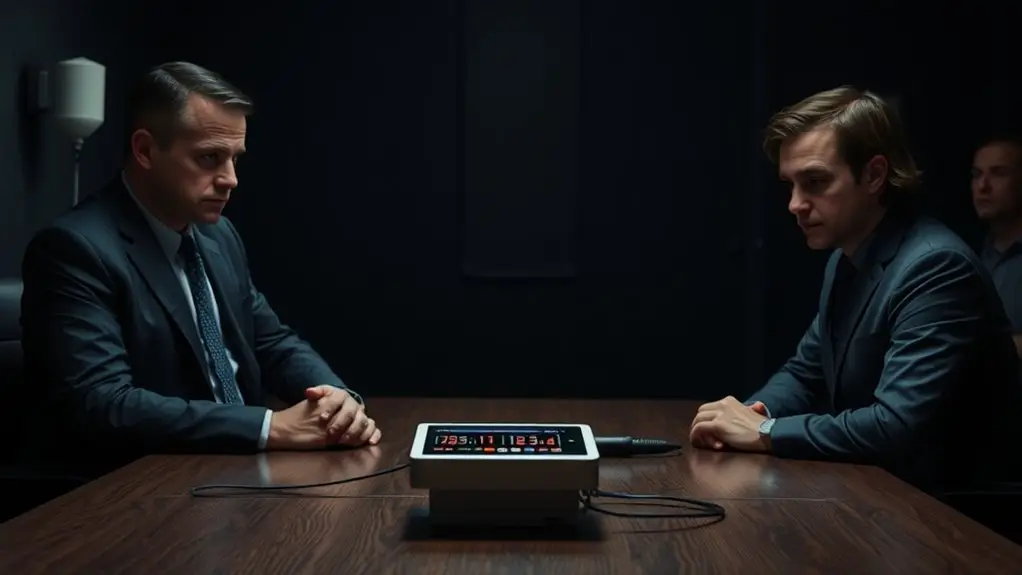Federal agents swap polygraphs for CVSA, signaling a significant shift in investigative methodologies. This move is driven by the CVSA’s reported 98% accuracy rate, offering a more reliable and non-invasive tool for detecting deception. As this technology gains traction, especially in sensitive areas like child sexual abuse cases, questions about its implications on legal standards and ethical boundaries surface, prompting a closer examination of its impact in the justice system.

Exploring the Shift From Polygraphs to Computer Voice Stress Analyzers
As law enforcement agencies increasingly prioritize accuracy and efficiency in lie detection, many are shifting from traditional polygraph tests to the more advanced Computer Voice Stress Analyzer® (CVSA®).
This technology adoption raises several ethical considerations. The shift involves evaluating the implications on suspects’ rights and the potential for misuse of technology.
Ensuring that CVSA is used fairly and transparently is vital. Agencies must navigate the balance between leveraging innovative tools and respecting individual liberties.
Training on ethical implementation is essential, to uphold justice while enhancing investigative processes.
This evolution in lie detection technology marks a significant turn in law enforcement methodologies.
Efficacy of CVSA in Child Sexual Abuse Investigations
The implementation of the Computer Voice Stress Analyzer® (CVSA®) in child sexual abuse investigations has greatly increased the efficacy of lie detection processes used by law enforcement.
Recent studies have shown that CVSA accuracy rates approach 98%, highlighting its reliability in differentiating truthful from deceptive responses. This heightened accuracy has notably aided in victim identification, with the technology playing an essential role in uncovering 87 previously undiscovered victims in recent cases.
The CVSA’s ability to detect subtle voice stress changes makes it an invaluable tool in the sensitive arena of child sexual abuse, bolstering investigations and aiding in the pursuit of justice.
The Operational Mechanics of Voice Stress Analysis
Voice Stress Analysis (VSA) technology, specifically the Computer Voice Stress Analyzer® (CVSA®), operates by detecting minute fluctuations in micro-tremors of the voice that often indicate stress associated with deception.
The CVSA software analyzes these micro-tremors during suspect interviews, interpreting variations in voice modulation as potential markers of deceit. This technique is considered an advanced form of deception detection, replacing older polygraph methods with a more subtle and potentially more revealing approach.
Legal Consequences Informed by CVSA Findings
Utilizing the Computer Voice Stress Analyzer® (CVSA®) in child sexual abuse cases greatly impacts legal outcomes, as the technology’s findings play a pivotal role in determining the severity of sentences.
When offenders admit to their actions during CVSA examinations, these confessions often trigger harsher legal repercussions. The accuracy of CVSA in identifying deceit influences decisions about the credibility of the offender’s admissions.
Consequently, verified admissions can lead to longer prison terms, especially when the testimony involves undiscovered live victims.
Ultimately, CVSA’s role is critical in shaping the judicial response to child sexual abuse cases, ensuring more stringent consequences for proven offenders.
Contact and Resource Information for CVSA Implementation
Agencies interested in implementing the Computer Voice Stress Analyzer® (CVSA®) for child sexual abuse investigations can contact NITV Federal Services for thorough support and resources.
The organization provides detailed CVSA training and extensive implementation strategies tailored to law enforcement needs. Agencies will receive guidance on integrating the technology into existing investigative processes, guaranteeing seamless adoption.
Training covers operational techniques, interpretation of results, and legal considerations. For further details on schedules, resources, and support services, agencies can reach out via phone at 888-266-7263 or email at Sales@cvsa1.com.
Secure effective deployment and utilization of CVSA by leveraging expert assistance.
Frequently Asked Questions
How Does CVSA Technology Handle Different Accents or Speech Impediments?
CVSA technology’s effectiveness in handling different accents or speech impediments remains unclear. The system’s accent detection and speech analysis capabilities require further clarification to guarantee reliability across diverse linguistic and speech variation cases.
Are CVSA Exams Admissible in Court as Evidence?
CVSA exams’ admissibility in court varies, depending on jurisdiction and assessment of CVSA reliability. Legal implications include determining its validity as evidence, influenced by studies showing high accuracy in detecting deception in suspects.
Can CVSA Be Used on Minors or Vulnerable Adults?
The use of CVSA on minors or vulnerable adults raises ethical considerations, focusing on protecting minors’ rights and ensuring the integrity of the investigative process while respecting the vulnerability of the individuals involved.
What Training Do Examiners Undergo for CVSA Certification?
Examiners undergo thorough training for CVSA certification, focusing on mastering the technology and understanding psychological aspects of stress responses. The certification process guarantees examiners meet stringent qualifications to accurately administer and interpret results.
How Is Privacy Maintained During CVSA Examinations?
To maintain privacy during CVSA examinations, stringent privacy safeguards and data protection protocols are implemented. These measures guarantee confidential handling and security of all sensitive information gathered during the investigative process.
Conclusion
The transition from traditional polygraphs to the Computer Voice Stress Analyzer (CVSA) represents a significant leap forward in forensic technology. While both methods aim to detect deception, CVSA offers several advantages over polygraph testing, including enhanced accuracy, reduced test duration, and lower operational costs. This non-invasive technique is reshaping investigative practices, particularly in areas like Chico and across Northern California. As law enforcement agencies increasingly adopt CVSA, its impact on truth verification in criminal investigations and other applications continues to grow, potentially leading to more efficient and ethical practices in the pursuit of justice.
For those facing legal challenges or seeking expert representation in cases involving lie detection technologies, it’s crucial to consult with experienced professionals. The Rooney Law Firm specializes in criminal defense and can provide valuable guidance on the implications of CVSA and polygraph evidence in legal proceedings. Their expertise can help ensure that your rights are protected and that the results of any truth verification tests are appropriately contextualized within your case.
